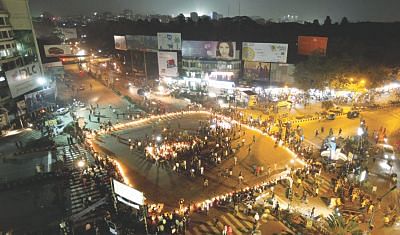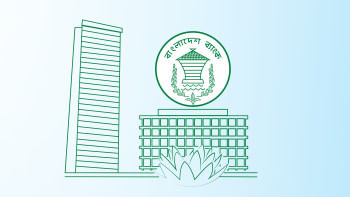OUTRAGED

Holding candles alight, people gathered at the capital's Shahbagh intersection last night to protest the awarding of life sentence to Quader Mollah and to demand capital punishment to the notorious war criminal. Photo: Rashed Shumon
People from all walks of life erupted into anger and frustration in the capital yesterday over the verdict of life sentence against war criminal Abdul Quader Mollah.
Hundreds of outraged students, activists and ordinary citizens blocked the Shahbagh intersection in the evening in a spontaneous reaction to the court's decision to award Mollah life imprisonment instead of capital punishment.
With slogans for death sentence to all war criminals, students brought out torch processions at different points in the Shahbagh area and the DU campus in the evening. They also held a candlelit vigil at the Shahbagh intersection.
Bloggers and Activist Network initiated the protest by organising a human chain in front of the National Museum. As hundreds of people poured in to join the protest, they decided to block the intersection.
“We will stay here all night and invite all citizens to join us,†said Mahmudul Haq Munshi, secretary of the network.
Information Minister Hasanul Haque Inu and Communist Party of Bangladesh President Mujahidul Islam Selim addressed the gathering at Shahbagh and expressed solidarity with the protesters.
Referring to the court verdict, writer Faruk Wasif said they have spoilt the values of the Liberation War by sparing Mollah death penalty.
Police and Rab members took positions around the intersection, diverting traffic from four directions.
“I was very surprised at the verdict,†said Abu Taleb, who sells sweaters in Farmgate.
Arguing that the crimes committed by Mollah were far worse than those by Bachchu Razakar, who was sentenced to death last month, he asked, “How can Mollah be spared when we all know about his role in the mass killings in Mirpur?â€
Mollah should have been awarded death penalty, said three paan sellers in Dhanmondi.
They argued that life imprisonment was not at all a punishment for the elderly Jamaat leader, who never faced the consequences of the atrocities he committed against his own people.
They said Mollah would walk free once the government changes.
An angry passer-by said, “The war criminals should be made to stand in line and shot dead, the same way they killed thousands of innocent people in 1971.â€
Many people suspected that there were political motives behind such a verdict.
"There must be something going on in the war crimes tribunal. I am quite surprised at the verdict," said Nilufar Yasmin from Narsingdi.
"I think the government has made the decision considering the upcoming election," said Delwar, a chauffeur.
“I don't know what to say because I really can't make out the true colours of these political parties,†said tailor Gazi. “In 1996, Awami League allied with Jamaat, and who knows, they may become friends again soon.â€
Like him many others said the trial was no longer about ensuring justice; it is just a political game for the parties now.
People all across the country criticised and rejected the verdict against Mollah.
Social networking websites and blogs were abuzz following the verdict as people updated their status on Facebook, tweeted, posted messages and articles denouncing the judgment.
The reactions ranged from “I am ashamed†to “The ICT is a farce†and more nuanced analysis of the socio-political realities of the country.

 For all latest news, follow The Daily Star's Google News channel.
For all latest news, follow The Daily Star's Google News channel. 



Comments